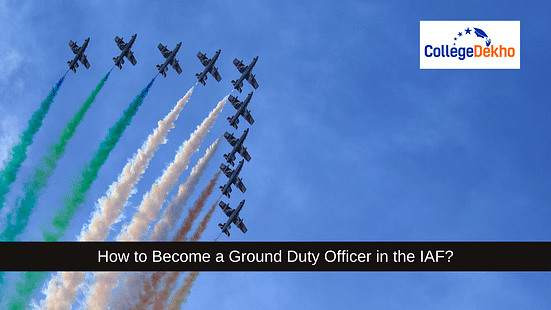
How to Become a Ground Duty Officer in the IAF? The Indian Air Force (IAF) is widely considered to be one of the world's most elite and technologically advanced air forces. Numerous individuals aspire to serve as IAF Ground Duty Officers. This comprehensive guide explains how to become a Ground Duty Officer in the IAF, providing insight into both the:
- Ground Duty (Non-Technical)
- Ground Duty (Technical) Branches
Before delving into the specifics of becoming a Ground Duty Officer, it is crucial to understand the structure of the IAF. It is mainly divided into three main branches:
- Flying Branch
- Ground Duty Branch
- Technical Branch
Also Read:
Ground Duty (Non-Technical) Admission Process
The Non-Technical Ground Duty branch is vital to the IAF's administration and management, thus, it is directed by the human and material resources branch.
Ground Duty (Non-Technical) Eligibility Criteria
To qualify for a Ground Duty (Non-Technical) Officer position, you must:
- Age: 20 to 26 Years for graduates (at the time of commencement of course)
- Marital Status: Candidates below the age of 25 and must be unmarried
- Nationality: Indian
- Gender: Both men and women
Selection Process for AFCAT Ground Duty (Non-Technical)
The selection process for Ground Duty (Non-Technical) Officers involves:
- Air Force Common Admission Test (AFCAT) : This is the preliminary selection phase. It is a written examination that assesses your general knowledge, verbal ability, numerical ability, and reasoning skills.
- AFSB Interview : After successfully clearing AFCAT written exam, candidates are invited for an AFSB interview, comprising various psychological and physical tests. This interview is designed to evaluate your officer qualities, leadership skills, and suitability for a career in the Indian Air Force.
- Training: To prepare candidates for their roles as Ground Duty (Non-Technical) Officers, the Air Force Academy (AFA) provides them with rigorous training. This training consists of physical fitness, leadership development, and specialised education in fields such as administration, accounting, and logistics.
Also Read:
Weapon Systems (WS) Branch Eligibility Criteria
Students must adhere to the eligibility criteria as listed below:
- At the 10+2 level, candidates must have earned a minimum of 50% aggregate in both Mathematics and Physics.
- Graduation with a minimum three-year degree in any field from a recognised university with a minimum of 60% aggregate or its equivalent.
Or,
BE/B Tech degree (four-year course) from an accredited university with a minimum of 60% aggregate or equivalent.
Administration Branch Eligibility Criteria
Responsible for managing both human and material resources efficiently. Some officers of the Administration Branch are chosen and trained to carry out the following responsibilities as well:
- Air Traffic Controller – Includes maintaining a smooth flow of traffic and managing airspace.
- Fighter Controller – Directs Fighter Aircraft and Weapon Systems against the enemy in various Air Operations while ensuring the nation's Air Defense through the use of Radar Networks.
Educational Qualifications Required
- Students must have passed 10+2 from an accredited university and obtained a minimum three-year graduate degree from any discipline.
- A minimum of 60% or equivalent aggregate marks are required in both the 10+2 and graduate degrees.
Or,
- Applicants have passed sections A and B of the Associate Membership examination of the Institution of Engineers (India) or the Aeronautical Society of India from a recognized university.
- A minimum of 60% or equivalent aggregate marks are required for this exam as an alternative qualification.
Accounts Branch Eligibility Criteria
The brand comes under the Short Service Commission for men and women and it is responsible for the efficient management of financial resources. Individuals also serve as internal auditors to ensure that external audits are flawless.
Educational Qualifications Required
Passed 10+2 and completed a bachelor's degree in any of the following disciplines with at least 60% aggregate marks or its equivalent from a recognised university:
- B.Com degree (minimum three-year degree course)
- Bachelor of Business Administration (with specialisation in Finance) or, Bachelor of Management Studies (with specialisation in Finance) or, Bachelor of Business Studies (with specialisation in Finance).
- CA/ CMA/ CS/ CFA qualified.
- B.Sc. with specialisation in Finance
Logistics Branch Eligibility Criteria
Individuals under this branch are responsible for administering all Air Force materials, efficient management of inventories and procuring various types of equipment.
Educational Qualifications Required
- A student must have passed 10+2 and possess a minimum three-year graduate degree from a recognised university in any discipline.
- A minimum of 60% or equivalent aggregate marks are required in both the 10+2 and graduate degrees.
Or,
- Applicants have passed sections A and B of the Associate Membership examination of the Institution of Engineers (India) or the Aeronautical Society of India from a recognised university.
- A minimum of 60% or equivalent aggregate marks are required for this exam as an alternative qualification.
Meteorology Branch Eligibility Criteria
As a Meteorology Branch Officer, candidates would be responsible for operating the most advanced satellite imagery and monitoring equipment, as well as advising operators on all weather-related matters.
Educational Qualifications Required
- A student must have passed 10+2.
- Have a BSc degree in subjects such as Physics and Mathematics.
- A minimum of 60% marks or equivalent is required for both 10+2 and B.Sc.
Or,
- The applicant must hold a four-year graduation degree in an Engineering/Technology discipline.
- A minimum of 60% aggregate marks or equivalent is required for this Engineering/Technology qualification.
The Engineering/Technology qualification can be in the following streams:
- Communication Engineering
- Computer Engineering /Technology
- Computer Engineering and Application
- Computer Science and Engineering /Technology
- Electrical and Computer Engineering
- Electrical and Electronics Engineering
- Electronics Engineering/Technology
- Electronics Science and Engineering
- Electronics
- Electronics and Communication Engineering
- Electronics and Computer Science
- Electronics and/or Telecommunication Engineering
- Electronics and/or Telecommunication Engineering (Microwave)
- Electronics Communication and Instrumentation Engineering
- Information Technology
- Mechanical Engineering
Ground Duty (Technical) Branch Admission Process
As an officer in the Ground Duty (Technical) Branch, you lead and manage your team to maintain the airworthiness of the IAF. Joining one of the sub-branches based on your qualifications would place you in charge of some of the most advanced equipment in the world. Here's how to join this branch:
Eligibility Criteria
To qualify for a Ground Duty (Technical) Officer position, candidates must adhere to the following requirements:
- Age: 20 to 26 years (at the time of commencement of course)
- Nationality: Indian
- Marital Status: Candidates below the age of 25 years should be unmarried.
Selection Process
The selection process for Ground Duty (Technical) Officers involves:
- AFCAT: As is the case with the Ground Duty (Non-Technical) branch, candidates must first take the AFCAT, which includes questions pertinent to their technical field.
- Engineering Knowledge Test (EKT): Candidates with a background in Engineering must also take the EKT, which evaluates their technical knowledge.
- SSB Interview: Similarly to the Non-Technical branch, the SSB interview assesses the applicant's officer-like qualities and suitability for the IAF.
Training
Once selected, candidates should attend the Technical Training School (TTS) for specialised training. This training provides them with the knowledge and skills necessary to handle technical aspects of aircraft maintenance, electronics, and related fields.
Aeronautical Engineering Branch Eligibility Criteria
Depending on your Engineering specialisation, you could join one of the Technical branch's sub-branches, such as Aeronautical Engineering, Electronics Engineering, or Mechanical Engineering.
Educational Qualifications Required
- An applicant must obtain a four-year Engineering degree or must be in their final year of the course.
- A minimum aggregate score of 60% or equivalent is required in any of the disciplines listed.
Note: (i) Final-year students are eligible to apply if they do not have any outstanding coursework at the time of the SSB examination and if they present a provisional or original degree issued by the university by the date specified in the advertisement.
(ii) The IAF releases advertisements for AFCAT in June and December.
Life as an IAF Ground Duty Officer
Many dream of flying high as brave pilots in the Indian Air Force (IAF). Yet, essential to keeping the IAF functioning smoothly are the Ground Duty Officers, who work behind the scenes. These officers take on diverse roles that form the backbone of the organization, ensuring efficient ground operations.
If you want to contribute to national security without flying, here's a glimpse into the life of an IAF Ground Duty Officer:
- Administration and Personnel Management: GDOs handle the administrative duties of Air Force units, managing personnel records, promotions, postings, and disciplinary actions. They ensure a positive work environment and address the welfare needs of their team members.
- Logistics and Supply Chain Management: Efficient logistics are essential for military operations. GDOs manage the procurement, storage, and distribution of equipment, fuel, and other resources, ensuring smooth operations without delays.
- Air Traffic Control and Flight Operations: Working with Air Traffic Controllers (ATCs), GDOs oversee airspace management and flight coordination for safety and efficiency. They schedule sorties, conduct briefings, and monitor aircraft movements on the ground.
- Meteorology and Weather Forecasting: Weather significantly affects flight operations. GDOs collaborate with meteorological experts to analyze weather data, issue forecasts, and advise pilots on safe flying conditions, reducing the risk of weather-related accidents.
- Security and Intelligence: GDOs protect Air Force installations and assets from internal and external threats. They work with intelligence agencies to gather and analyze security information, ensuring the safety of sensitive military sites.
- Education and Training: Continuous learning is crucial in the Air Force. GDOs train recruits, conduct workshops, and organize professional development programs to enhance the skills and capabilities of the workforce.
Challenges of a Ground Duty Officer in IAF
Working in the Indian Air Force is challenging. Ground Officers must be strong and adaptable to handle tough situations. They need to be disciplined, focused, and passionate about their work. Handling stress and fatigue well is important. Physical and mental fitness is essential for them. Life as a Ground Duty Officer in the Indian Air Force is demanding but rewarding. It requires resilience, adaptability, and a strong sense of duty. The job involves long hours, frequent travel, and strict rules. However, the satisfaction of serving the nation, camaraderie with colleagues, and opportunities for personal and career growth make it an excellent career choice.
The IAF is a way of life, a commitment to excellence, and a path to becoming a leader in the skies. Take the first step toward becoming an IAF Ground Duty Officer and soar with the eagles if you possess the requisite passion and determination.
If you have further queries related to the AFCAT 2 2024 exam, you can ask questions on the QnA zone . For admissions-related inquiries, fill out our Common Application Form (CAF) or call 18005729877 to talk to the experts.
Are you feeling lost and unsure about what career path to take after completing 12th standard?
Say goodbye to confusion and hello to a bright future!

FAQs
The average monthly work schedule for Indian Air Force Airmen is between 75 and 100 hours. A career as an Airman in the IAF involves long hours, frequent travel, and the possibility of working nights, weekends, and holidays.
The choice between Combined Defence Services (CDS) and AFCAT depends on career goals. AFCAT is exclusive to the IAF, whereas CDS offers opportunities across the military as a whole. These three branches, including the Army, Navy, and Air Force, are admitted by CDS. The minimum requirement is passing the 10+2 boards with an overall 60% aggregate mark.
A total of six attempts are there for AFCAT. The flying branch only accepts applicants under the age of 24 because the process takes a year from the start of the exam to the final selection. This means that once you turn 23 your attempt is ineffective, giving you a total of six chances to establish your worth between the ages of 20 and 23.
The minimum height requirement for a ground duty officer in the IAF is 157.5 cm for men and 152 cm for women. Specific ground duty branches and roles may have different requirements. For appropriate and latest information, applicants must check the latest official IAF recruitment notifications.
No, the AFCAT exam is not tough provided you have the basics cleared. The difficulty of the AFCAT exam varies from candidate to candidate. It assesses mathematics, English, reasoning, and general knowledge. Preparation and practice can improve the chances of success.
A ground duty officer in the IAF is essentially the one who takes on non-flying responsibilities such as administration, logistics, education, accounting, legal, meteorology, and other essential specialised functions for Air Force operations.
The salary of a ground duty officer in IAF is estimated as given in the table below:
Particular | Average Estimated Salary (in INR) |
|---|---|
Flying Branch | 1,08,792 |
Ground Duty (Technical) Branch | 95,262 |
Ground Duty (Non-Technical) Branch | 85,262 |
To become a ground duty officer in the IAF, you will need to have a bachelor's degree, as well as meet certain age requirements and pass the AFCAT exam. Specific requirements vary by branch and role.
To join the IAF as a ground duty officer, you need to get a passing score on the AFCAT exam and fulfil all of the eligibility requirements. After passing the AFCAT, shortlisted applicants will be called for an SSB interview, which consists of multiple psychological and physical tests. This interview assesses your officer qualities, leadership skills, and suitability for a career in the IAF.
Was this article helpful?


















Similar Articles
List of BHMCT Specialisations: Admission, Fee, Career, Job Scope
How to score 90 percentile in NCHMCT JEE 2025?
What is a Good Score & Rank in NCHMCT JEE 2025?
List of Colleges Accepting 5,000-10,000 Rank in NCHMCT JEE 2025
Colleges Accepting 10,000-30,000 Rank in NCHMCT JEE 2025
NCHMCT JEE 2025 - Top Government IHMs in India